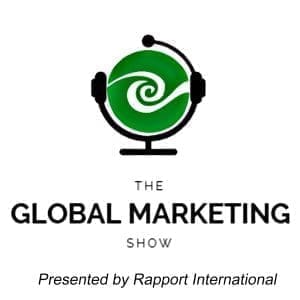
Navigating cultural differences while building a company culture or consistent brand voice can be challenging, but it is not insurmountable, says Carole Copeland Thomas, a recent podcast guest on The Global Marketing Show (episode 131), especially with support from knowledgeable experts and a willingness to learn.
Carole is founder of C. Thomas & Associates, a full-service speaking, training, & consulting firm specializing in multiculturalism, diversity, and women’s issues (http://www.tellcarole.com/). In this episode, she outlines how culture – and cultural differences – affect Relationships, and she provides real-world advice on successfully navigating and incorporating those differences into local and larger communities.
Carole has found that the definition of “culture” can be nebulous; when asked, we all instantly know what it means, but it’s hard to define. By her description, the concept encompasses the social norms, behaviors, knowledge, arts, beliefs, customs, and habits of a group of people. As an expert in diversity, equity, and inclusion (DEI) for over 40 years, she likes to explain it using the “Iceberg Model of Culture” developed by Edward T. Hall in 1976.
The top of the cultural iceberg stays visible to everyone. It contains the community’s fine arts, literature, music, food, games, and dress. People outside the culture see these superficial elements.
The bottom of the iceberg, the biggest part of any culture, hides beneath the surface and influences less quantifiable aspects like:
The examples above illustrate only a small number of all the cultural components that might affect company culture and co-worker relationships. Other areas of potential contention commonly include:
Typically, people understand their own cultural norms yet underestimate how much cultural differences can affect relationships. Listen to the full episode for additional details on these real-world culture-clash situations Carole has managed.
In one instance, a client company’s employee hailed from an island in the Caribbean where non-intimate physical contact was acceptable in the workplace, among all genders. Issues arose when others misconstrued the behavior as inappropriate. By helping the team understand the employee’s cultural context and setting clear expectations, Carole was able to restore respectful, solid working relationships and a unified company culture.
In another instance, a young manager was hired to lead a team of about 25 people, including a dozen employees older than the new hire. Unbeknownst to the new manager, the older Black members of the team expected the manager to address them as “Mr.” or “Ms.” to show respect for the age difference. Resentment within the team grew, until Carole and the manager uncovered the issue and found appropriate ways for the manager to address the workers. As Carole puts it: in some cultures, age commands respect and in others, it’s about one’s status or position. Navigating through this can be difficult.
And even with her expertise in cultural issues, Carole has encountered cultural challenges in her personal life. When she became a grandmother, she wanted a special name instead of being called “grandma” like her mother. Since she frequently travels to Kenya, Carole decided she liked “nyanya,” Swahili for “grandma.” Only after years of her granddaughters calling her nyanya did she learn that the familiar name for grandma in Swahili is actually “bibi.” Throughout, her granddaughters were actually using the formal term for “grandmother,” which is also Swahili for “tomato”!
Solutions
In every cross-cultural situation, Carole first aims to build rapport and alignment. She assesses the manager’s awareness and willingness to improve relationships and if she can work with the individual, she collaborates with them to enhance the team, starting with fundamentals such as:
Ultimately, Carole’s best advice for working cross-culturally starts with you:
Carole’s experiences are real-world proof that these strategies work to bridge cultural divides and build thriving, cohesive teams and communities. Listen to the full episode for even more excellent advice!
Links:
Website: www.CaroleCopelandThomas.com
LinkedIn: https://www.linkedin.com/in/carolecopelandthomas/
Iceberg Model of Culture: https://bccie.bc.ca/wp-content/uploads/2020/09/cultural-iceberg.pdf
Connect with Wendy – https://www.linkedin.com/in/wendypease/
Music: Fiddle-De-Dee by Shane Ivers – https://www.silvermansound.com
Notifications